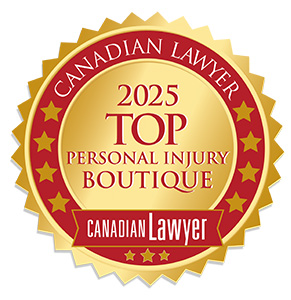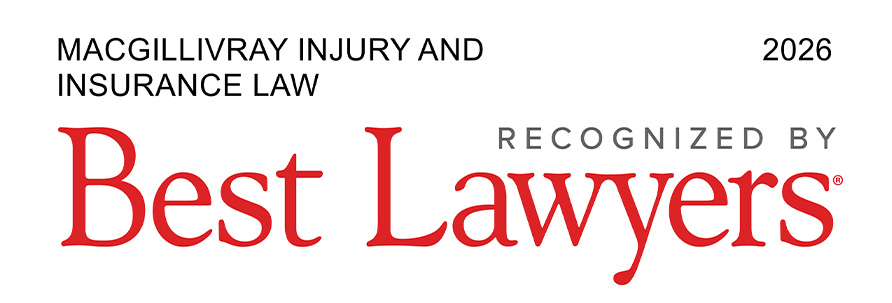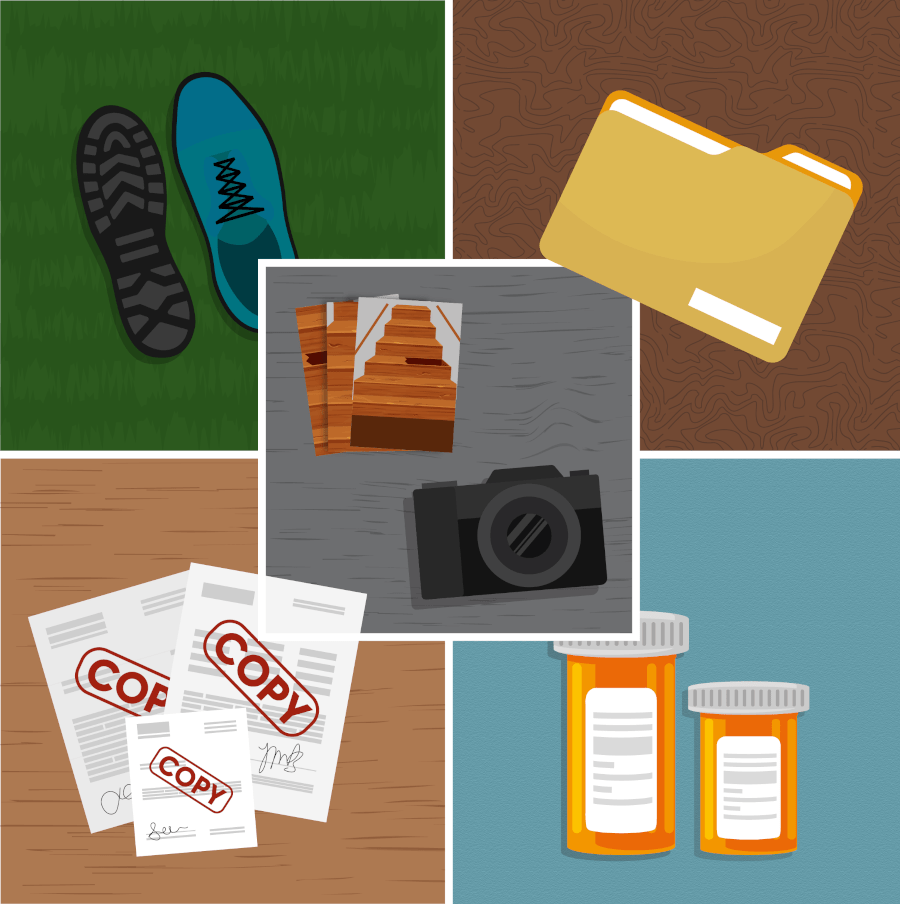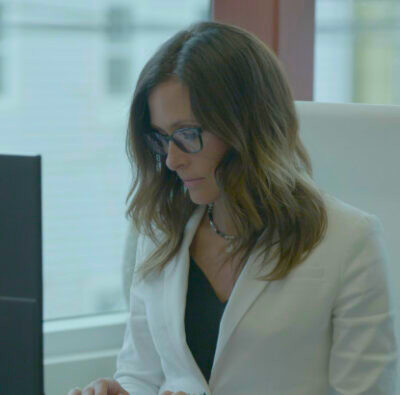



Can I sue after a slip and fall accident?
The term “slip and fall” immediately brings to mind an icy sidewalk or a careless spill in a grocery store, but the category is much broader. If you are injured in a fall caused by someone else’s negligence, you may be able to take legal action against the negligent party to recover damages.
Falls caused by someone else’s negligence often arise from:
- Slippery, wet floors
- Ice on sidewalks, driveways, or front steps
- Cracks or potholes in the pavement
- Improper or missing handrails on stairs
- Poor construction of steps and stairs
- Insufficient lighting
- Carpet that is torn or not adequately secured
If you’ve been injured in a slip and fall accident caused by someone else’s negligence, contact our team for a free consultation.
Common questions about slip-and-fall injuries
For 30 years, we’ve been helping injury victims receive the compensation they deserve. We can answer your questions in a free consultation.
- How do you determine who is at fault for a slip and fall injury?
- How much is my slip and fall injury claim worth?
- How long do I have to sue after a slip and fall accident?
- How do I prove someone was at fault for my injury?
- Do I need a lawyer for my slip and fall claim, and how much does it cost?
- Can I sue if I slip and fall in a store?
- Can I sue for a slip and fall accident at a rental property?
- Can I sue for a slip and fall accident on a sidewalk?
- Can I sue my employer if I slip and fall at work?
- Can I sue if I slip and fall at someone’s house?
How do you determine who is at fault for a slip and fall injury?
There are three approaches to the standard of care expected of property owners in Canada. “Standard of care” refers to the degree of caution expected under particular circumstances. These three approaches to the standard of care are based on occupier’s liability legislation, common law of occupier’s liability, and the general principles of negligence. The relevant approach will depend on the province in which the slip and fall incident occurs.
There are many factors to consider when deciding whether an occupier met their duty of care. These factors include:
- the efforts the property owner made to warn people about any danger on the property,
- whether the property owner knew the person was on the property,
- whether the property owner should reasonably be expected to protect against the risk, and
- the injured person’s ability to appreciate the danger.
A personal injury lawyer will assess the case facts and determine if you have a right to compensation for your injury. Book a free consultation today.
How much is my slip and fall injury claim worth?
In a slip-and-fall injury claim, you can be awarded financial compensation, called “damages” under the following categories:
- General damages for pain and suffering
- Loss of housekeeping and valuable services
- Cost of future care
- Past lost wages
- Diminished earning capacity
- Special damages for anything you paid for out of pocket
You can use our Injury Claim Calculator to learn more about how a claim is evaluated.
The amount of money awarded under each category depends on the loss incurred as a result of your injury. Some common injuries that arise from falls include:
- Ankle fractures or breaks
- Wrist fractures or breaks
- Concussions
- Hip fractures or breaks
- Neck, back, and spinal cord injuries, such as herniated discs
- Shoulder dislocation
- Muscle strains
- Knee fractures or breaks
Keeping an organized record of your appointments, time missed from work, injury-related limitations, and any money spent because of the injuries sustained in the fall is valuable information in building your case.
Since each claim is unique, the best way to get an accurate valuation of your claim and maximize your award is to speak with an experienced personal injury lawyer.
How long do I have to sue after a slip and fall accident?
As a general rule, you must file a personal injury lawsuit within two years of date of the accident. However, this can vary per the legislation for each province, and there are conditions that can shorten or extend this deadline. For example:
- If the injured party is a minor, the limitation period is extended.
- If the property is owned by a municipal, provincial, or federal government, you may have to notify them of your intention to sue earlier than the two-year deadline and the limitation period may be shorter than two years.
Although you may have two years to file a personal injury lawsuit, you should engage a lawyer as soon as possible after an accident to make sure that time-sensitive evidence is collected, like photos of the dangerous property conditions, security video footage, or witness statements. If you delay, this evidence may be lost or obstructed, making it more difficult to prove negligence.
An experienced personal injury lawyer has a thorough understanding of the laws and limitation periods that apply to slip and fall accidents. If you’d like to learn the limitation period that applies to your claim, book a free consultation with our team. Contact us as soon as possible to avoid losing your right to compensation.
How do I prove someone was at fault for my injury after a fall?
The more evidence that is collected, the easier it will be to prove that someone else was at fault for your injuries. You should take photos of the area where you fell, both up close and of the wider area. These photos will carry the most weight if they are taken at the time of the fall to represent the scene accurately. Showcasing that you wore appropriate footwear will also help prove the fall wasn’t your fault. If your injuries require emergency care, go to the hospital right after the accident. If not, you should see your family doctor or go to a walk-in clinic to create a medical record of your injuries. Keep any receipts for costs arising from your injury, such as physiotherapy sessions, prescriptions, or over-the-counter medication.
When you hire a personal injury lawyer, they will guide you through the legal process and ensure that all necessary evidence is collected to prove your case.
Do you need a lawyer for your slip and fall claim, and how much does it cost?
Insurance companies work hard to pay you as little as possible after you’ve been injured in a slip-and-fall. A lawyer will communicate directly with the insurance company, gather the reports and evidence needed, evaluate the costs associated with your injuries and medical care to increase the value of your claim, negotiate settlements on your behalf, consult with expert witnesses, and offer you peace of mind that they are working in your best interest while you focus on recovering from your injuries. Read about the advantages of hiring a personal injury lawyer for your slip and fall claim.
We work on a contingency fee basis, which means that you do not pay anything until your case settles or you are awarded compensation at trial. Our fees are a percentage of your award which we deduct at the conclusion of the case. We cover all upfront costs, such as expert reports used to support your case and maximize your claim value. Before your case settles, you will know how much you will get in your pocket after deducting all fees and expenses. And if we do not reach a successful outcome, you pay nothing.
Book a free consultation to learn more about how we can help you resolve your claim.
Can I sue if I slip and fall in a store?
If you are injured due to a slip and fall in a store caused by the store’s negligence in not keeping the premises reasonably safe, you can take legal action. The following slip and fall cases demonstrate outcomes where the injured party won damages in court. Typically, personal injury claims settle out of court. However, lawyers can use principles established by specific court cases, known as “case law”, to argue for favourable settlements for their clients.
Lawson v. Costco Wholesale Canada Ltd., [2010] OJ No. 1457: Ms. Lawson sued Costco after slipping on a piece of lettuce that had fallen from a Caesar salad display, injuring her shoulder, leg, and hip. Her lawsuit was successful because Costco failed to follow its maintenance system, and the store could not prove that the employees had cleaned the floors to remove hazards.
Legood v. Atlantic Wholesalers Ltd. (c.o.b. The Atlantic Superstore), [2002] NBJ No. 43: Ms. Legood sued Atlantic Wholesalers after she slipped and fell in a pool of watermelon juice while shopping in the store. She was successful because Atlantic Wholesalers could not show that its employees had followed the maintenance plan and checked the floor areas to remove hazards.
Marche v. Empire Co., [2000] N.S.J. No. 80: Ms. Marche slipped on a grape in a grocery store, injuring her tailbone and lower back. The grocery store was held liable because of the unusual danger that the grape presented, and the store knew that produce often fell on the floor. The store fell below the standard of care because there were no mats, no warning signs, and the mopping was insufficient to eliminate the risk. Ms. Marche used reasonable care for her own safety, and the store was held 100% liable for her injuries.
Can I sue for a slip and fall accident at a rental property?
If you are injured due to a slip and fall at a rental property caused by the property owner’s negligence in not keeping the premises reasonably safe, you can take legal action. If the landlord is liable, compensation would be sought from their insurance company. The following slip and fall cases demonstrate outcomes where the injured party won damages in court. Typically, personal injury claims settle out of court. However, lawyers can use principles established by specific court cases, known as “case law”, to argue for favourable settlements for their clients.
Hunter v. Anderson, [2010] BCJ No. 1485: Ms. Hunter was a tenant who injured her elbow, requiring surgery, after slipping on black ice on the outside stairs at her apartment. She was 75% liable for the accident because she wasn’t wearing proper winter footwear, and she was responsible for removing snow from the stairs in exchange for a reduction in rent. The landlord was still 25% liable for Ms. Hunter’s injuries.
Can I sue for a slip and fall accident on a sidewalk?
Icy sidewalks are a daily hazard for Canadians during the winter. The drastic changes in weather over time can also lead to large potholes or cracks in the pavement that can become tripping hazards. Depending on the facts of your case, you may be able to take legal action for a slip and fall on a sidewalk. Note that since many sidewalks and roads are owned by the government, there may be more stringent timelines regarding giving notice of your intention to pursue legal action.
The following slip and fall case demonstrates an outcome where the injured party won damages in court. Typically, personal injury claims settle out of court. However, lawyers can use principles established by specific court cases, known as “case law”, to argue for favourable settlements for their clients.
Bowden v. Withrow’s Pharmacy Halifax (1999) Ltd, [2008] NSJ No. 360: Ms. Bowden slipped and fell while stepping from the sidewalk onto a crosswalk in slushy conditions. The sidewalk was in front of the pharmacy, but the pharmacy contracted with another company to do snow removal, and the Halifax Regional Municipality was responsible for the crosswalk and the sidewalk. The pharmacy was not liable, and the municipality settled the claim with Ms. Bowden.
Can I sue my employer if I slip and fall at work?
Generally, if you are injured in a slip and fall accident at work, you will be covered under Workers’ Compensation benefits. If you are not covered under Workers’ Compensation benefits, you can bring a civil claim in tort. It is important to keep in mind that there are nuances that vary from province to province. If you were injured at work and are unsure of how to proceed, you should seek legal advice.
Can I sue if I slip and fall at someone’s house?
If you’ve been injured at someone’s house due to the homeowner’s negligence in not keeping the premises reasonably safe, then they may be held liable for your injuries. Typically the homeowner’s insurance would cover this scenario. The following slip and fall case demonstrates an outcome where the injured party won damages in court. Typically, personal injury claims settle out of court. However, lawyers can use principles established by specific court cases, known as “case law”, to argue for favourable settlements for their clients.
Gill v. A&P Fruit Growers Ltd., [2009] BCJ No. 593: Mr. Gill fell out of the back door of a mobile home without stairs or a landing. He was under the influence of alcohol at the time, and the occupier did not warn him that there were no stairs. He stepped out of the mobile home without hesitation, having failed to look before taking a step, and was 30% liable for his injuries. However, because the occupier invited Mr. Gill onto the property, the occupier had a duty to warn him about the danger and failed to do so, so the occupier was 70% liable for Mr. Gill’s injuries.
What is the law for slip and fall accidents in Nova Scotia, PEI and Ontario?
Nova Scotia, PEI, and Ontario each rely on their own legislation, the Occupiers’ Liability Act, to determine who is at fault for a slip-and-fall injury. All three provinces require that a property owner, or “occupier”, take care to ensure that people on their premises are reasonably safe. Occupiers are the people who:
- have physical possession of the premises;
- have control over it; or
- are responsible for the condition of, activities on, or people allowed on the premises.
In determining the responsibility of the property owner, you must consider:
- the knowledge that the property owner has or ought to have known of the likelihood of people or property being on the premise,
- the circumstances of entry into the premises,
- the age of the person entering the premises,
- the ability of the person entering the premises to appreciate the danger,
- the effort made by the property owner to warn people of the risk, and
- whether the risk is one that the property owner could have offered some protection against.
Certain exceptions apply to the provisions of each province’s Act.
Learn more about slip and falls accidents in Nova Scotia, PEI, and Ontario.
What is the law for slip and fall accidents in New Brunswick and Newfoundland and Labrador?
Unlike Nova Scotia and PEI, neither New Brunswick nor Newfoundland and Labrador have an Occupiers’ Liability Act. Instead, both provinces outline occupier’s liability in the case law.
New Brunswick occupier’s liability
In New Brunswick, occupier’s liability relies on the general negligence laws. Property owners must maintain safe premises, like the requirements set out in the legislation used by other provinces. Liability arises where a property owner breaches their duty, and this breach causes you foreseeable harm. As the injured party, you have the burden to show that the property owner fell below the standard of care, causing the fall.
Following Morash v. McAllister Place, 1997 CanLII 9495 (NBQB), the issue addressed in determining a property owner’s liability is whether they provided reasonably safe premises for the intended uses of the property. For example, a mall owner must ensure reasonable safety for people of all ages that shop and carry items throughout the mall. If the mall owner fails to do so, they must show that this failure caused your injury.
The New Brunswick Court of Appeal in McAllister (Litigation Guardian of) v. Wal-Mart Canada Inc., 2000 CanLII 12588 (NBCA) confirmed that property owners must provide reasonably safe premises for the purpose contemplated.
For more information, visit our page on slip and falls in New Brunswick.
Newfoundland and Labrador occupier’s liability
In Newfoundland and Labrador, Stacey v. Anglican Churches of Canada, 1999 CanLII 18933 (NLCA) considered whether courts remained bound by the traditional law or whether the common law had evolved enough to declare that it was no longer necessary to follow the traditional path. The Newfoundland Court of Appeal held that the present law of occupiers’ liability needed adjustments and set out the new test for determining an property owner’s duty of care. Presently, a property owner must ensure the premises are reasonably safe for the purposes for which the person is on the property.
Godden v. Wal-Mart Canada Corp. 2008 NLTD 2 applied this new test from Stacey. Here, Wal-Mart did not meet the standard of care owed to Ms. Godden because it did not clean the spill at the customer service desk.
For more information, visit our page about slip and fall accidents in Newfoundland and Labrador.
What is the law for slip and fall accidents in Ontario?
In Ontario, parties determine liability using the Occupiers’ Liability Act. Property owners must meet the standard of being reasonable and prudent, owing a duty to ensure that people on their property are reasonably safe by protecting them from foreseeable harm.
There is a two-part test for cases of this nature, shown by Dhaliwal v. Premier Fitness Clubs Inc., 2012 ONSC 4711. There are two elements to consider when determining if a property owner is liable for breaching its standard of care:
- whether they implemented a reasonable maintenance system; and
- whether they adhered to that system on the date of the slip and fall.
Did the occupier have a reasonable maintenance system in place to keep people on the premises safe from foreseeable harm? As outlined in Chan v. Erin Mills Town Centre, 2005 Carswell Ont 6741, the standard of care is one of reasonableness in the circumstances. This means that high-risk areas, such as bathrooms, often require greater vigilance and better systems because the risk of wet floors in these areas is more significant, increasing the likelihood that someone will slip and fall. If you slipped and fell in a high-risk area, the occupier’s maintenance system would require greater vigilance. To avoid liability, a property owner would have to show that their maintenance system addressed the greater likelihood of someone slipping.
Did the property owner follow its reasonable maintenance system on the date of the accident? This means that the property owner must provide evidence that they executed their maintenance system on the day you fell. This evidence can include a maintenance log detailing what the property owner did to clean the premises on that day. If the property owner can’t provide this evidence, they are likely liable for your injuries.

Have questions for our team?
Frequently Asked Questions
Request a
Free Consultation
If you would like to learn your legal options at no obligation, contact us today to set up a free consultation.
